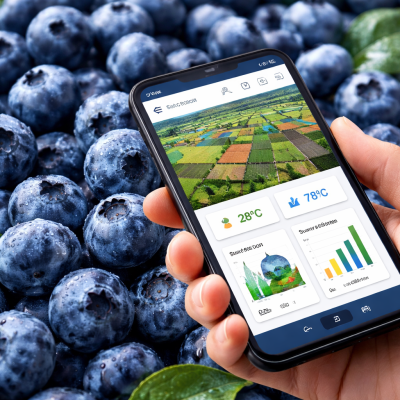Highlights from the IBO Summit 2025 – South Africa
- . October 2025
Cape Town became the global capital of blueberries this September as industry leaders, researchers, and growers from every producing region gathered for the IBO Summit 2025, hosted by Berries ZA. With the iconic Table Mountain as backdrop, delegates came together under one shared purpose — to connect minds and grow the future of the global blueberry industry.
“Hosting the Summit in South Africa was a true honour for us,” said Brent Walsh, CEO of Berries ZA. “It was a wonderful opportunity to welcome the global blueberry community, showcase our country’s capabilities, and strengthen collaboration across all regions of the industry.”
A True South African Welcome
The Summit opened with song and spirit, as a praise singer set the tone for a heartfelt celebration of culture and collaboration. IBO Chairman, Mario Steta, officially welcomed participants, reminding everyone of “the power of a small blue berry bringing us all together.”
Hosts Brent Walsh and Elzette Schutte, Operations Manager at Berries ZA, led an engaging three-day program supported by this year’s sponsors and partners. The first day featured a powerful keynote by Ambassador Darci Vetter, who offered fresh perspectives on how industries can navigate global trade in times of uncertainty.
Regional Strength, Global Vision
Day two began under clear Cape Town skies, setting the stage for one of the Summit’s standout discussions — Southern Africa as a Production Region into the Future, moderated by Louw Pienaar (BFAP). Panelists Brent Walsh (South Africa), Alistair Campbell (Zimbabwe), and Albert Basson (Namibia) shared insights into the region’s evolution, emphasizing collaboration, innovation, and responsible growth. The session truly embodied this year’s theme: Connecting Minds, Growing Futures.
“After attending the Summit, my overall impression is that this is a thriving and growing industry, implementing important changes that have led to a more stable year-round supply and higher product quality — which, in turn, has improved consumer satisfaction and helped drive consumption,” said Andrés Armstrong, Executive Director of the Chilean Blueberry Committee.
“While Peru continues to lead exports and global supply growth, other countries such as Morocco and China are also expanding steadily. Meanwhile, traditional producing countries like the United States, Chile, and South Africa are facing increased competition, forcing them to adjust and innovate to remain competitive.
I would highlight the efforts of South Africa and Chile, where varietal renewal is playing a key role in reshaping exports — improving quality and allowing volumes to rise again.”
From North America, Kasey Cronquist, President of the U.S. Highbush Blueberry Council (USHBC) and North American Blueberry Council (NABC), contributed to the Global Production panel and moderated the session “Machine Harvesting: Genetics and Technology Advancements.” Alongside other global leaders, he emphasized the importance of innovation, varietal adaptation, and technology in ensuring competitiveness and efficiency across regions.
Luis Miguel Vegas, General Manager of ProArándanos, moderated one of the most insightful sessions of the Summit, Genetic Development — How Much Further?, which brought together leading experts to discuss innovation in genetics and the next frontier of variety development.
Following the event, Vegas shared several key takeaways in a LinkedIn post. He underlined the importance of varietal renewal as a strategic decision for business sustainability and the growing role of market segmentation that distinguishes between premium, standard, and consumption-oriented varieties. He also pointed to innovations in pollination — combining science and data analytics to enhance yields — and emphasized that sustainability under ESG criteria is now essential for both competitiveness and investment. Vegas further noted South Africa’s ambition to position itself, along with Namibia and Zimbabwe, as a strong export hub targeting emerging markets such as India and China.
Strategic Outlook
A special session led by Mario Steta and Gustavo Yentzen (IBO Secretariat) presented the IBO Strategy 2025/2026, outlining the organization’s priorities for its next chapter. Their reflections centered on key questions:
How is the IBO evolving after 15 years of growth?
How do we fund our ambitions responsibly?
How can we build on our strengths while addressing weaknesses?
The concise but impactful presentation provided a roadmap for the IBO’s continued leadership in research, data, and collaboration.
Closing Reflections
The closing session, co-moderated by Ambassador Darci Vetter and Chairman Mario Steta, brought together Theo Lombard, David Jackson, Miguel Bentin, and Peter McPherson for an unfiltered look at the state of the industry.
Key Takeaways
Avoid commoditisation: Echoing Professor David Hughes’ 2015 warning — “Don’t let blueberries go bananas.” Value, differentiation, and demand-building remain essential.
Unity across the chain: From nurseries to retailers — “Let’s be blue together.”
Policy and trade: Market access, data sharing, and inter-country cooperation are fundamental to resilience.
Efficiency and innovation: Variety renewal and consistent quality will safeguard profitability.
Sustainability first: When asked to rank priorities, delegates placed social and environmental sustainability above all.
The Summit concluded with a gala dinner, where Mario Steta expressed heartfelt thanks to the IBO Committee, Berries ZA, and the South African hosts for their warmth and excellence. He praised their “lekker spirit” and reminded all delegates that the essence of the blueberry community lies in sharing — of knowledge, vision, and commitment.
“The next chapter must deliver bigger, better, crunchier, sweeter berries — and a stronger, united industry.”
10-01-2025
IBO Original Content







